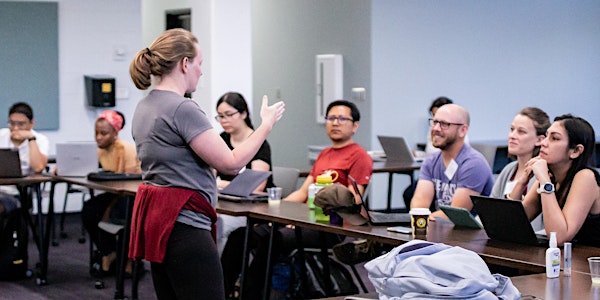Summer Institute in Plant Breeding (in person)
10 - 14 June 2024
Saint Paul, Minnesota, USA
Offered by the
Plant Breeding Center at the University of Minnesota, also featuring instructors from the University of Wisconsin-Madison
Modules
Participants can register for one module in Set 1 (Monday to Wednesday noon) and one module in Set 2 (Wednesday afternoon to Friday afternoon):
SET 1
- Plant Breeding 101 (James A. Anderson)
- Mixed-Model Analysis in Plant Breeding (Lucia Gutierrez)
SET 2
- Polyploid Genomics (Laura M. Shannon)
- Participatory Plant Breeding (Julie Dawson)
- Data Bootcamp for Genomic Prediction in Plant Breeding (Aaron J. Lorenz)
Target Audience
Plant Breeding 101 is intended for those who seek a course in the fundamentals of plant breeding (technicians, data scientists, managers, non-plant breeding graduate students, etc.).
The five other modules are intended for M.S. and Ph.D. students, postdocs, and industry scientists.
Costs
US $490 for graduate students, postdocs, and faculty
US $650 for industry participants
Cost includes lunch and morning and afternoon breaks. Breakfast, dinner, and accommodations are not included. We regret that scholarships or reduced fees are unavailable.
Questions?
Contact Rex Bernardo by email (bernardo@umn.edu)
-------------
Module descriptions
Plant Breeding 101. This course is for those who seek to learn the fundamentals of plant breeding (e.g., technicians, data scientists, managers, non-plant breeding graduate students, etc.). Each session will include lecture/discussion, demonstrations, and problem-solving with sample data.
Session 1: Genetic variation, qualitative and quantitative inheritance, heritability
Session 2: Phenotyping, experimental design, genotype x environment interaction, data analysis and summary
Session 3: Modes of reproduction, types of cultivars, parent selection, breeding methodologies
Session 4: Genetic mapping, breeding using major genes/markers, genomic prediction
Session 5: Polyploidy, breeding for pest resistance, breeding asexually propagated species, intellectual property protection
Mixed-Model Analysis in Plant Breeding. This course provides an introduction to mixed-model analysis will cover the following topics: matrices and matrix manipulations; linear models; mixed effects models and their development; covariance structures; mixed-model equations; shrinkage; properties of estimates and predictions; analysis software; and applications in experimental designs and in plant breeding. The course will involve lectures, problem sets, and hands-on data analysis activities.
Polyploid Genomics. Polyploidy (and accompanying rediploidizaion) is a major component of plant evolution. All flowering plants have undergone at least one whole genome duplication event in their history. Furthermore, a wide variety of important crop plants are current polyploids. Despite the ubiquity of polyploidy, polyploid genomes are difficult to analyze. They complicate many of the tools and models most commonly used in genomics and breeding. This course will involve lectures, discussions, problem sets, and hands-on data analysis activities.
Session 1: Polyploid evolution
Sessions 2-3: Challenges presented by genotyping and sequencing polyploids; tools to overcome them; ways of determining ploidy
Sessions 4-5: Population and quantitative genetic theory for autopolyploids; new tools for polyploidy research
Participatory Plant Breeding. This course is for plant breeders who are evaluating the advantages (and disadvantages) of incorporating participatory methods into their breeding program. Each session will include lecture/discussion, demonstrations, and problem-solving with case studies.
Session 1: Overview of participatory plant breeding, including different types of PPB and examples; types of engagement and participation, PPB programs internationally and domestically
Session 2: Determining when participatory methods are advantageous to a breeding program; crops and markets, environments, seed markets, seed regulation and intellectual property
Session 3: Design of participatory breeding programs; types of trial designs, types of varieties released, commercialization methods
Session 4: Experimental design and analysis for different types of participatory programs; applying core concepts, methods for decentralized and unbalanced trials
Session 5: Practical aspects of managing a participatory program; engagement, logistics, troubleshooting, scaling-up, evolution of goals and methods
Data Bootcamp for Genomic Prediction in Plant Breeding. This course will cover common data structures, analysis techniques, and tools used for genomic selection in plant breeding. This course will include lectures and hands-on activities. (Prerequisite: basic knowledge of programming in R)
Sessions 1-2: Formatting and quality control of genotype/phenotype data for genomic prediction, model implementation and exploration of various types of models, techniques in cross validation for assessing prediction accuracy
Sessions 3-4: Training population optimization, multi-trait prediction, genomic prediction for genotype x environment interaction, predictions of all possible crosses
Session 5: Other special topics in genomic prediction, tour of available tools for implementing genomic prediction
